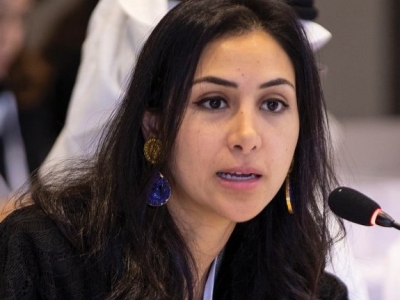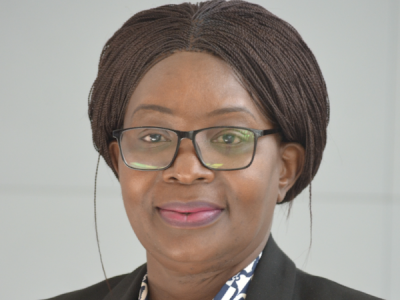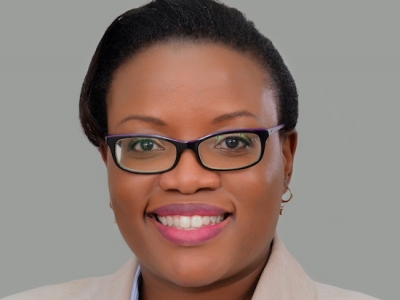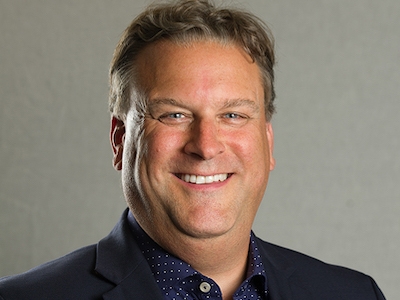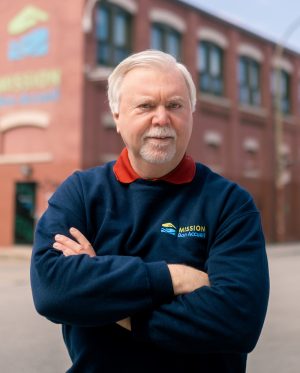 Samuel Watts is CEO and Executive Director of the Welcome Hall Mission, a 130-year-old nonprofit organization in Montreal that works with people experiencing homelessness, families living in precarity, and young and single mothers, at-risk youth and the elderly. The Mission has approximately 225 full-time employees and 300 volunteers. Watts spoke to PANL Perspectives about leadership issues in the nonprofit sector related to homelessness and housing, especially in Montreal and Toronto. The interview has been shortened and edited in parts.
Samuel Watts is CEO and Executive Director of the Welcome Hall Mission, a 130-year-old nonprofit organization in Montreal that works with people experiencing homelessness, families living in precarity, and young and single mothers, at-risk youth and the elderly. The Mission has approximately 225 full-time employees and 300 volunteers. Watts spoke to PANL Perspectives about leadership issues in the nonprofit sector related to homelessness and housing, especially in Montreal and Toronto. The interview has been shortened and edited in parts.
Question: Did you start in the private sector? How did you end up at a nonprofit?
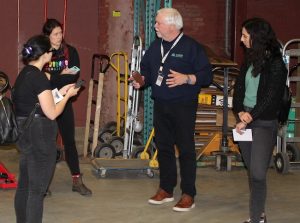 Watts: I’m the most unlikely nonprofit leader you may ever find. From my earliest days in high school, I always thought I’d work in the world of business, not nonprofits. I worked in a number of marketing roles in business, and afterwards, began a 14-year career as a management consultant, which exposed me to dozens of businesses and nonprofit organizations. When I walked into the Welcome Hall Mission as CEO, that was unusual — it was unusual that someone with very little experience in the sector could just walk in and become a leader of an iconic Montreal nonprofit organization. I’ve been here seven years, and we’ve roughly doubled the overall size of the Mission, and done some pretty creative things on top of what was already created.
Watts: I’m the most unlikely nonprofit leader you may ever find. From my earliest days in high school, I always thought I’d work in the world of business, not nonprofits. I worked in a number of marketing roles in business, and afterwards, began a 14-year career as a management consultant, which exposed me to dozens of businesses and nonprofit organizations. When I walked into the Welcome Hall Mission as CEO, that was unusual — it was unusual that someone with very little experience in the sector could just walk in and become a leader of an iconic Montreal nonprofit organization. I’ve been here seven years, and we’ve roughly doubled the overall size of the Mission, and done some pretty creative things on top of what was already created.
Q: What shifts have taken place in your part of the sector?
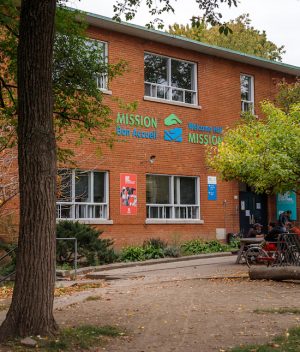 Samuel Watts: Here’s the big shift that’s been happening in our sector: we moved away from the notion of a “patch” towards the notion of a “solution.” A patch, to me, is a bowl of soup, or a food bank, or a bed for the night, with few supports outside of emergency services. That was part of the ethos of a particular era in the past hundred years — the belief that someone had to “pull themselves up by their own bootstraps,” or figure things out on their own. Now, we’re solution providers, rather than patch appliers. We still do emergency help, which is the same principle as an emergency room in a hospital. We help now, and we help along the way, to guide people to the solutions they want.
Samuel Watts: Here’s the big shift that’s been happening in our sector: we moved away from the notion of a “patch” towards the notion of a “solution.” A patch, to me, is a bowl of soup, or a food bank, or a bed for the night, with few supports outside of emergency services. That was part of the ethos of a particular era in the past hundred years — the belief that someone had to “pull themselves up by their own bootstraps,” or figure things out on their own. Now, we’re solution providers, rather than patch appliers. We still do emergency help, which is the same principle as an emergency room in a hospital. We help now, and we help along the way, to guide people to the solutions they want.
For example, our emergency services to people experiencing homelessness are entirely geared around housing. So, when someone comes in for the first time, we asked them why they’re here and how we can help them, and what would they like to have in terms of permanent housing — and we work with them to get them to that point. A number of other providers across Canada are doing the same thing.
Q: I’ve heard about “free” grocery stores in Montreal. Can you explain?
 Watts: We run a food-security program organized around two free, grocery stores that serve approximately 10,000 people each month. It’s a model of that we started, and it generated some interest across North America. People can choose what they want from the stores, and they don’t have to line up to get in. Their repeat shopping is limited by family size, income criteria and other criteria, but the grocery store isn’t the end point. The reason why they’re there is something we can capture, and there are social workers who can work with those individuals or families to help them get to a point where they won’t need us anymore.
Watts: We run a food-security program organized around two free, grocery stores that serve approximately 10,000 people each month. It’s a model of that we started, and it generated some interest across North America. People can choose what they want from the stores, and they don’t have to line up to get in. Their repeat shopping is limited by family size, income criteria and other criteria, but the grocery store isn’t the end point. The reason why they’re there is something we can capture, and there are social workers who can work with those individuals or families to help them get to a point where they won’t need us anymore.
We focus on helping people get to that next space. It’s founded on the principal of agency (so, people get choice) and dignity (people experience a positive thing when they come in). There are no bended knees here. Our volunteer workers thank people for shopping with us.
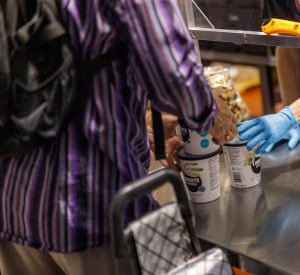 The solution to food insecurity isn’t more food-distribution points. It’s to reduce poverty. What I’d love to see is the number of users go down at our free grocery stores because poverty is being reduced. Hunger in Canada isn’t the problem. We have more than enough food to feed people. The problem is the inequality of food distribution, and the fact that we have a certain percentage of people who live below the poverty line — that they have to ask themselves if they can pay their rent at the end of the month, or buy boots for their kids, or have to go without a couple of meals.
The solution to food insecurity isn’t more food-distribution points. It’s to reduce poverty. What I’d love to see is the number of users go down at our free grocery stores because poverty is being reduced. Hunger in Canada isn’t the problem. We have more than enough food to feed people. The problem is the inequality of food distribution, and the fact that we have a certain percentage of people who live below the poverty line — that they have to ask themselves if they can pay their rent at the end of the month, or buy boots for their kids, or have to go without a couple of meals.
Q: From your point of view, what shifts have you noticed among foundations?
Watts: The foundations having a significant impact are the ones moving away from a rigidly oriented grant-awarding process and moving towards establishing partnerships with carefully selected civil society organizations in key areas. These could be making progress in specific areas, like environmental stewardship, the arts or housing. Foundations are best advised to develop robust partnerships with key service organizations that have “institutional capacity,” set goals and monitor milestones. Partnerships are required at a variety of levels, including with government. We’re not going to solve major, complex social challenges without partnerships.
Q: You mentioned government. What’s the situation in Quebec in terms of partnerships in your sector?
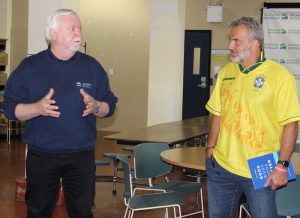 Watts: We’re not going to solve social challenges without partnerships with all three levels of government. Homelessness, which is one of our sectors at the Welcome Hall Mission, isn’t just a federal problem — and isn’t just a provincial problem, and it isn’t just a municipal problem. It’s all three.
Watts: We’re not going to solve social challenges without partnerships with all three levels of government. Homelessness, which is one of our sectors at the Welcome Hall Mission, isn’t just a federal problem — and isn’t just a provincial problem, and it isn’t just a municipal problem. It’s all three.
In Quebec, many national policies that touch on areas of shared jurisdiction require the approval of the Quebec government in order for programs to take effect. This can produce funding delays. In our sector, in Quebec, most of the funding flows through the health care network, which is also a massive bureaucracy. At the Mission, we end up in an unusual spot in our sector, having to talk to both the federal and provincial governments, as well as having to sure the municipal governments aren’t excluded, unlike in Toronto, for example, where major social issues have been download to cities. That’s not the case here in Montreal; our city doesn’t have any leverage, funding-wise, with some of the issues.
Q: What critical shifts have to happen in government?
Watts: I’ve said to some of my friends in government, “We’re going to have to start looking at issues — like poverty, like the housing crisis, like violence against women, those sorts of things — we’re going to have to look at them through the same lens as we looked at the pandemic.”
The only way we’re going to solve these issues is if we act together. Currently, in Montreal there are at least four or five plans for how to deal with homelessness and housing, and none of them coordinate properly. The good news in Canada, excluding a few hotspots, is that the numbers aren’t at a level where I would say, “I don’t know where to start.”
Q: How do you remain positive in light of the crises in housing and other parts of our sector? How do you maintain a positive perspective?
 Watts: Policy moves at the speed of public opinion. Advocates in our sector have primarily focused on representations to the different orders of government without a coherent strategy related to shaping public opinion. My positivity comes from the fact I’m beginning to see public opinion move in a direction that will convince politicians to move forward. A very good example is housing or poverty. Four or five elections ago, those issues weren’t popular. In recent elections, these issues were in the top four or five priorities.
Watts: Policy moves at the speed of public opinion. Advocates in our sector have primarily focused on representations to the different orders of government without a coherent strategy related to shaping public opinion. My positivity comes from the fact I’m beginning to see public opinion move in a direction that will convince politicians to move forward. A very good example is housing or poverty. Four or five elections ago, those issues weren’t popular. In recent elections, these issues were in the top four or five priorities.
There are around 12,000 people in Toronto currently experiencing homelessness who can be identified — and there are certainly many more who are hidden — but a challenge of this size can be resolved. In Montreal, it’s roughly half that number.
One of the challenges is that we don’t have good, real-time data across the country, but we do have good answers for about 80% of the population that finds itself experiencing homelessness. They can be re-housed with a little bit of effort and the support systems around them. There’s a 20% segment — that’s the segment that the media often focuses on – that are very complex cases, and we have to develop solutions for them. As a society, we’re wealthy, and we can resolve issues regarding homelessness.
Welcome Hall Mission (Mission Bon Accueil) is on LinkedIn and Twitter. They’re also on Instagram and Facebook in French and English. Photos are courtesy of the Mission.
Thursday, August 17, 2023 in For homepage, Leadership & Governance, News & Events
Share: Twitter, Facebook
